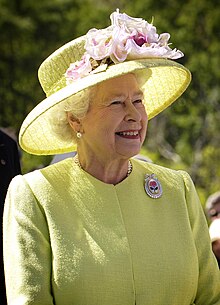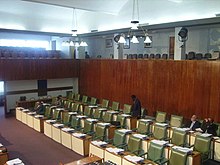Jamaica Political System
The Political System of Jamaica is in the form of a parliamentary representative democratic monarchy organized. It has a bicameral parliament . The constitution was drawn up in 1962 by the parties in parliament together in a committee set up for this purpose. It is based heavily on the state organization of the United Kingdom .
In the democracy index 2019 Jamaica ranks 50th out of 167 countries, which means that the country is considered an "incomplete democracy".
Head of state
The King or Queen of the United Kingdom is also the head of state of Jamaica. Queen Elizabeth II has held this position since 1952 . It is represented by the Governor General , who is appointed on the proposal of the Prime Minister. The tasks are of a representative nature, with the head of government de facto setting the political content and the political orientation . At the annual official opening of parliament, the governor general announces the speech from the throne . The current Governor General, Patrick Allen , has been in office since February 26, 2009.
houses of Parliament
Jamaica has a bicameral structure. The House of Representatives ( lower house or Lower house ) consists of 60 members ( Members of Parliament or MPs ), every five years to be re-elected. The Senate ( Oberhaus or Upper house ) comprises 21 people, all of whom are appointed by the Governor General. 13 of the 21 senators are appointed in consultation with the prime minister, for the other eight the governor-general is in consultation with the opposition leader. To be appointed Senator, you must be 21 years of age, be on the House electoral roll, and be a permanent resident of Jamaica. Furthermore, there is an incompatibility between membership in the House of Representatives and the Senate. In principle, all citizens of the Commonwealth of Nations can be appointed senators who have been resident in Jamaica for at least 12 months.
The requirements for a passive election to the House of Representatives are basically identical to those of the Senators. The voting age for exercising the right to vote is 18 years.
Legislative activity is basically the responsibility of the House of Representatives. The constitution says: " Parliament may make laws for the peace, order and good government of Jamaica ". In order to introduce such a legislative initiative in the House of Representatives, it needs the support of 15 other parliamentarians in order to meet the quorum of 16 supporters. One of the most important tasks of the House of Representatives is sovereignty over the budget.
The main role of the Senate is to review laws passed by the House of Representatives. The Senate can also initiate legislative initiatives. Financially effective projects are excluded from this. In practice, however, the majority of initiatives originate from the House of Representatives. On the part of the Senate, there is only the possibility of a suspensive veto . Financially effective acts of the House of Representatives can be postponed for a maximum of one month, all other acts for a maximum of seven months. When forming the cabinet, a maximum of four ministers are elected by the Senate.
The elections to the House of Representatives are carried out according to the relative majority vote (constitution Art. 66, 67). This means that the country will be divided into as many constituencies as there are MPs to vote for. Each constituency sends a representative. The person elected is who can unite the most valid votes in the first ballot. The consequence of this right to vote is a two-party system .
Legislative process
As is common in many Anglo-Saxon countries, the legislation in Parliament to Bill called, as long as it has not been adopted by Parliament. The bills passed by parliament are laws and are known as law .
The Senate or the House of Representatives can initiate bills. The majority of legislative initiatives originate in the House of Representatives. Either a cabinet member or a group of at least 16 MPs can initiate such an initiative. If this first step is successful, the first reading takes place in the House of Representatives. No content-related debates are allowed here. The project is only given a name and a date is set on which the content of the subject will be debated in the House of Commons for the first time.
On the date set in the first reading , the content of the bill is now being debated. This debate is known as the second reading . A vote will be taken at the end of this debate. If the bill does not receive a simple majority of the votes, the project has already ended here. If the matter is approved by a majority, it is passed on to a committee.
A special committee ( Select Committee ) is set up , consisting of a small number of members. Here the bill is discussed and discussed in detail. Changes are discussed in the committee and implemented or rejected after a vote. A bill cannot be completely discarded in the committee, since this competence is exclusively incumbent on the House of Commons. After the committee has reached a conclusion, a spokesman reports on the changes the committee made.
Now the bill is moving from the committee back to the House of Commons. It will be put to the vote there. No changes can be made in this third reading . If a majority votes for the proposal, it will be referred to the Senate.
There the procedure of the lower house is repeated. If the Senate approves the proposal, the Royal Assent is required . This last act is in fact no longer denied. A final refusal occurred in 1708 under Queen Anne . The governor general acts as the queen's representative. After the Royal Assent and its publication, the Bill is officially a law .
If the Senate sees a need for changes, it transfers the bill back to the House of Representatives. If the latter approves the Senate amendment, only a Royal Assent is now required . If the lower house does not agree, the Senate can use its suspensive veto. After this veto expires, the Royal Assent can be issued.
government
The head of the largest parliamentary group is appointed prime minister by the governor general. He appoints his cabinet, which must consist of at least eleven people (Constitution, Art. 69 (1)). Each Minister ( Cabinst Minister ) is supported by State Ministers and Parliamentary Secretary . Each minister is responsible for a specific ministry. He is responsible for this department. Ministers can be dismissed from office by the Prime Minister after consulting the Governor General.
Since all parliamentary acts only require a simple majority and the largest parliamentary group de facto always holds this majority due to the two-party system, the prime minister has a great deal of power. If a project by the Prime Minister does not receive the required majority in a vote in Parliament, it will be removed by the Governor General (Constitution, Art. 71 para. 1,2).
In addition to the nomination of 13 of the 21 senators by the Prime Minister, the following points are among his most important tasks:
- He proposes the Governor General to the Queen of the United Kingdom.
- He proposes the members of the Jamaican Privy Council (similar to the Privy Council of the United Kingdom) to the Governor General .
- He proposes to the Governor General a candidate for the office of Chief Justice .
Since the prime minister depends on parliament and loses his office if he loses his vote, one of his most important means of pressure is dissolving parliament. At the proposal of the Prime Minister, the Governor General can dissolve Parliament and call new elections.
jurisdiction
The highest court of appeal in criminal and civil matters is the Court of Apeal . It consists of a President ( Chief Justice ) who is appointed by the Governor General together with the Prime Minister and at least three other judges. The exact number is determined by Parliament. In addition to the Court of Appeal, there is a Supreme Court , which is responsible for particularly serious offenses and for certain civil matters.
The maximum age of judges at appointment is 70 years. Removal from office is generally possible. This requires the cooperation of the Prime Minister and the Governor General as well as the Judicial Committee of the Privy Council , a special judicial body in London , which is responsible, among other things, for litigation in certain Commonwealth countries.
See also
Web links
Individual evidence
- ↑ Democracy-Index 2019 Overview chart with comparative values to previous years , on economist.com
- ^ Nations of the World: A political, economic & business handbook , 2008, p. 790
- ↑ a b Constitution of Jamaica (English) . Retrieved April 11, 2010.
- ↑ Overview of Jamaica . Retrieved April 11, 2010.


